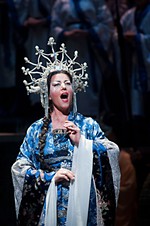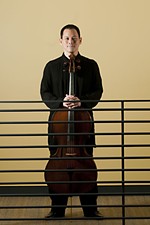Austin Symphony Orchestra With Joshua Bell
Bell's prowess as a violinist recalled the song of the mockingbird
Reviewed by Robert Faires, Fri., Sept. 16, 2011
Austin Symphony Orchestra With Joshua Bell
Dell Hall at the Long Center, 701 W. RiversideSept. 9
A goddamn mockingbird.
I know that's hardly an orthodox opening for a classical music review, and I'm sorry if it causes offense, but honestly, all I could think as I listened to Joshua Bell wing his way through the concert kicking off the Austin Symphony Orchestra's 101st season was that's what he is.
Please understand that I mean no disrespect with that phrase. On the contrary, like the great Texas naturalist Roy Bedichek, I hold our state bird in the highest regard. For purity of tone, for an uncanny ability to make almost any kind of sound, for vivacity, for nerve, the mocker is the bird to beat. And so it was with Bell as he performed with the ASO on Friday. In the beginning of the Tchaikovsky "Méditation" as arranged by Glazunov, his tone was as mellow and creamy as caramel, but against the orchestra's nudging, it grew progressively sharper, like a blade against a whetstone. Before long, he was doing the nudging, challenging the orchestra in quick phrases punctuated by a quarter-turn of his body back toward the musicians behind him. And in his second piece of the evening, Glazunov's violin concerto – the sort of charmingly old-fashioned piece that wears its heart on its sleeve, rather like "Danny Boy" reimagined by Tchaikovsky – Bell wrung every bit of drama from it, though the feeling was always so subtly modulated, so artfully conjured that it never felt less than honest. At times, he also played the mockingbird literally, perfectly mimicking orchestral phrases with a clarity that took one's breath away. And yet as skillful as he was, Bell never flaunted his mastery – hence the profane adjective, which was the only one that provided the appropriate emphasis for this musician's astonishing prowess.
Bell's appearance was bookended by works intended to mark the anniversary of 9/11. Conductor Peter Bay led the ASO through Richard Strauss' Death and Transfiguration with a fitting show of respect and remembrance that settled into a gentle peace at the end. In closing the concert, their potent reading of Rimsky-Korsakov's Russian Easter Overture did more to raise the audience in an air of triumph. As the piece began, a moth flew into and out of the light shining down on the orchestra, and it seemed a manifestation of the concert's spirit: carrying us away on the wings of birds, the wings of angels.











